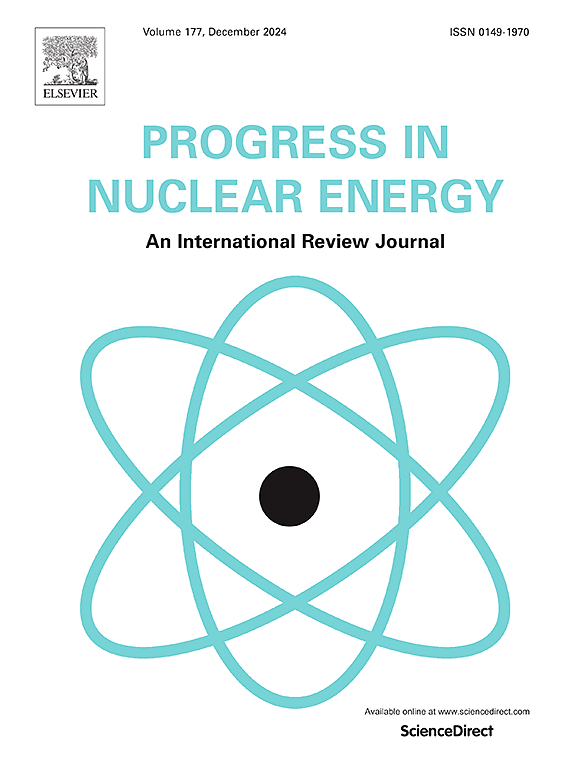Research on the prediction of transient parameters in rod bundle channel based on POD-ML method
IF 3.3
3区 工程技术
Q1 NUCLEAR SCIENCE & TECHNOLOGY
引用次数: 0
Abstract
Reduced-order modeling (ROM) has been widely used to reduce the complexity of physical models by mapping full-order conservation equations to lower-order subspaces or constructing data-driven surrogate models. Compared with traditional computational fluid dynamics (CFD) simulations, reduced-order modeling is more computationally efficient in large-scale simulation calculations. In this study, we propose a reduced-order modeling framework under transient conditions using a combination of Proper Orthogonal Decomposition (POD) and machine learning (ML), which is used to implement the transient prediction of parameters in the channel of a rod bundle. The comparison results of the two different prediction methods show that the LSTM + POD method is more suitable for analyzing the short prediction of the simple varying temperature distribution and z-direction mass flow distribution. The prediction under complex conditions and the long prediction of the z-direction mass flow distribution are not as effective as the POD + LSTM method, which can provide a solution for the prediction of other transient systems in the future.
基于POD-ML方法的杆束通道暂态参数预测研究
降阶建模(ROM)通过将全阶守恒方程映射到低阶子空间或构造数据驱动的代理模型来降低物理模型的复杂性。与传统的计算流体力学(CFD)模拟相比,降阶建模在大规模模拟计算中具有更高的计算效率。在这项研究中,我们提出了一种结合适当正交分解(POD)和机器学习(ML)的瞬态条件下的降阶建模框架,用于实现杆束通道参数的瞬态预测。两种预测方法的对比结果表明,LSTM + POD方法更适合分析简单变温分布和z方向质量流量分布的短期预测。复杂条件下的预测和z方向质量流量分布的长时间预测不如POD + LSTM方法有效,可以为未来其他瞬态系统的预测提供解决方案。
本文章由计算机程序翻译,如有差异,请以英文原文为准。
求助全文
约1分钟内获得全文
求助全文
来源期刊

Progress in Nuclear Energy
工程技术-核科学技术
CiteScore
5.30
自引率
14.80%
发文量
331
审稿时长
3.5 months
期刊介绍:
Progress in Nuclear Energy is an international review journal covering all aspects of nuclear science and engineering. In keeping with the maturity of nuclear power, articles on safety, siting and environmental problems are encouraged, as are those associated with economics and fuel management. However, basic physics and engineering will remain an important aspect of the editorial policy. Articles published are either of a review nature or present new material in more depth. They are aimed at researchers and technically-oriented managers working in the nuclear energy field.
Please note the following:
1) PNE seeks high quality research papers which are medium to long in length. Short research papers should be submitted to the journal Annals in Nuclear Energy.
2) PNE reserves the right to reject papers which are based solely on routine application of computer codes used to produce reactor designs or explain existing reactor phenomena. Such papers, although worthy, are best left as laboratory reports whereas Progress in Nuclear Energy seeks papers of originality, which are archival in nature, in the fields of mathematical and experimental nuclear technology, including fission, fusion (blanket physics, radiation damage), safety, materials aspects, economics, etc.
3) Review papers, which may occasionally be invited, are particularly sought by the journal in these fields.
 求助内容:
求助内容: 应助结果提醒方式:
应助结果提醒方式:


